
17 minute read
Evaluation of Boron Esters in Lithium Complex Greases Prepared with Hydrogenated Castor Oil
Vijay Deshmukh, Bhupendra K. Rajput Standard Greases & Specialities Pvt. Ltd.
Abstract:
Traditionally, lithium complex greases are prepared using complexing agents such as boric acid, sebacic acid, azelaic acid etc. to boost the dropping point of lithium base greases. These complexing agents are added in the initial stage of soap making. The process of lithium complex grease preparation using these complexing agents is tedious, time consuming and not very flexible.
The advent of Boron Esters as dropping point boosters has made the Lithium Complex grease making process very simple, less time consuming, flexible and economical. The commercial boron esters are recommended in lithium greases prepared using 12 hydroxy stearic acid (12 HSA) and these boron esters are added at the final stage of the process before homogenization and at temperatures below 90°C, like other performance additives. The boron ester additive suppliers recommend their additives to be used in Lithium Grease prepared with 12 HSA as the same are not very effective in boosting the dropping point in lithium grease prepared with Hydrogenated Castor Oil (HCO).
Lithium complex greases using boron esters with Hydrogenated Castor Oil (HCO) have been prepared with a modified process to get higher dropping point. This paper describes the evaluation of some commercially available boron esters as dropping point boosters in lithium greases prepared using Hydrogenated Castor Oil (HCO) in place of 12 hydroxy stearic acid (12 HSA). The resulting boost in dropping point is almost same as in lithium complex grease with 12 HSA. Lithium complex greases have been prepared with HCO in different base oils using the modified process and different boron esters. The results are discussed. Lithium complex grease prepared with HCO & one of the boron esters has been tested fully & its properties are compared with lithium complex grease prepared with 12 HSA with the same boron ester. The comparative test data indicates that the developed process gives superior lithium
- 42 VOLUME 80, NUMBER 4
complex grease. The various advantages of the process have been discussed.
Introduction:
NLGI Annual Production Survey of 2013 indicates that over 77 % of the total grease produced in the world is based on lithium soap. Out of this, around 19% is lithium complex grease. As per the survey, Lithium Greases having dropping point above 210°C are considered as complex greases in the NLGI Production Survey. In India, around 90% of the total grease produced is lithium base and out of this, around 5-‐7% is Lithium complex grease.₁ Lithium Complex Greases are popular for high temperature applications especially in Steel Plants where the operating conditions are most severe. These greases are also used as long life wheel bearing greases in automotive industry. For wide temperature applications, lithium complex greases are also prepared using synthetic oils such as PAO, OSP etc.
Traditionally, lithium complex greases are prepared using complexing agents such as boric acid, salicylic acid, dibasic acids etc. Among the dibasic acids, sebacic acids and azelaic acids are the most popular. Lithium complex greases prepared using sebacic acid and azelaic acid in synthetic hydrocarbon have similar physical properties.₂ Cost of these acids keep on varying and plays a role in the final selection of these acids for use as a complexing agent.
In lithium complex grease, the boric acid & dibasic acids as complexing agents are introduced in the initial stage of saponification. The use of these complexing agents increases the percentage of lithium hydroxide and there by increases the cost of the product. The manufacturing process for these greases is generally an open kettle process and is tedious, long and not very flexible.
It is known that lithium complex greases having high dropping points, good extreme pressure properties and very satisfactory water resistance properties can be
prepared by employing boron esters/ boron esters-‐amine complexes in lithium hydroxy fatty acid soap thickened greases. It appears on the basis of IR analysis and other evidence that a stable co-‐ordinated compound is formed by electron sharing between the boron atom of the boron ester and hydroxyl group of the hydroxy fatty acid soap, which accounts for the difference in the effect of the boron ester compounds in hydroxy fatty acid soap thickened greases and conventional fatty acid soap thickened greases.₃
The advent of Boron Esters as complexing agents has made the lithium complex grease making process simple. The presence of boron esters is not required in the initial cooking stage. It is added at the end of the manufacturing stage before homogenization/milling like other performance additives. The addition of boron ester does not increase the percentage of lithium hydroxide. Lithium complex greases produced by adding boron esters as complexing agents have shorter batch cycle times as compared to lithium complex greases conventionally manufactured using dibasic acids. This results in energy savings & improved production efficiency.₄
The boron esters employed to raise the dropping point of lithium greases are compounds of alkyl or aryl borates or aliphatic amines/ amides to form boron ester adducts or complexes. The boron esters added to lithium base greases form lithium borates which change the dropping point of lithium base greases. The change in dropping point varies depending upon the type of lithium borate formed i.e. monolithium borate, dilithium borate or trilithium borate or mixture of these borates. It has been established that presence of dilithium borate increases the dropping point to a large extent.₅ Presence of lithium phosphate also plays a role in boosting the dropping point.
It is also known that boron esters possess friction reducing, antiwear and antioxidant characteristics when blended in lubricating oils. X-‐ray photo electron spectroscopy and X-‐ray diffraction reveal that boron esters can be adsorbed on the rubbing surface and some of the adsorbed borate film degrades and forms boron nitride which is responsible for reducing the friction.₆ It has been observed that lithium complex greases prepared from 12 HSA are slightly transparent and darker in color and have poor mechanical stability. The lithium complex grease preparation with boron ester is definitely easier and less time consuming as compared to preparing lithium complex grease using dibasic acids or boric acid as complexing agent. In addition, use of boron esters gives flexibility and reliability regarding getting the required high dropping point.
The commercially available boron esters from various additive manufacturers are recommended in lithium base greases made from 12 HSA. Although, the lithium base greases prepared with 12 HSA are converted to lithium complex greases with high dropping point by addition of boron esters, the lithium complex greases so formed have poor mechanical stability as compared to complex greases prepared using dibasic acids as complexing agents.
The mechanical stability in terms of difference between 60 strokes and 100 k strokes penetration and roll stability is inferior in lithium complex grease prepared with 12 HSA as compared to lithium complex grease with HCO. The cost of the final grease also goes up as 12 HSA is costlier than HCO. Further, the batch cycle time of lithium complex grease with HCO is reduced as the saponification is carried out in pressure vessel.
Dropping point booster additives based on boron ester chemistry are available in the market from reputed additive manufacturers. All these additive suppliers advise to use their additive in lithium base grease prepared with 12 HSA. The dosage recommended by most of the additive manufacturers range from 1 to 3 % of the total charge and the additives are recommended to be added at temperatures below 90° C. The regular use of these additives in lithium greases prepared with 12 HSA in recommended dosages have confirmed that the use of these additives raises the dropping point to more than 260°C there by converting normal lithium base grease into lithium complex grease. However, the same boost in the dropping point is not observed if these additives are added in lithium base grease prepared from HCO.
A special process has been developed to convert conventional lithium base greases prepared with HCO into lithium complex greases with the addition of boron ester. The same additives which are used as dropping point boosters based on Boron ester chemistry in lithium base greases with 12 HSA are used in lithium complex greases prepared with HCO to boost the dropping point.
Experiment 1
For the study, five samples of commercially available boron esters were collected. These additive samples were identified as A, B, C, D & E. As per the Technical Data Sheets of these boron additives, the chemical structures of these additives are different. They are alkyl boron esters, boron amide complex or boron amine complexes etc.
Lithium complex greases were prepared in the laboratory using Group 1 paraffinic oil of VG-‐ 100, Hydrogenated Castor Oil (HCO) and the boron ester additives. Each batch was prepared separately for each additive. The developed process was used to manufacture these batches. In all the batches same dosage (3 %) of boron ester additives were used. The batches were milled through colloid mill. All the batches were tested for dropping point as per ASTM D-‐2265 test method. The results are given in Table 1.
TABLE 1
Dropping Point of Lithium Complex Greases with HCO & Paraffinic oil
Table 1 shows the results of dropping point of lithium base greases made with HCO, paraffinic oil and with different boron ester additives. The developed process was successful in raising the dropping point of all lithium base greases prepared from HCO with all the different boron esters. The additive dosages in all the samples were same. The efficiency in boosting the dropping point was however different. But all the samples gave dropping points more than 260°C which is generally the requirement in the specification of Lithium complex grease.
The dropping point of Lithium Complex greases using boron esters A, B, C, D &E are depicted on bar chart below.
The additives C&D give highest boost in dropping point.
It was observed that the developed process of preparing lithium complex grease from the lithium base grease with HCO has been successful and gives dropping point above 260°C with all the boron esters tested. The boost in dropping point varies depending upon the type of boron ester used. The dosages of boron esters can be further optimized there by further reducing the cost of the lithium complex grease.
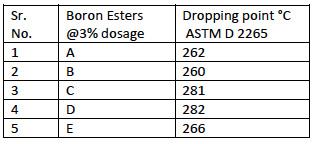
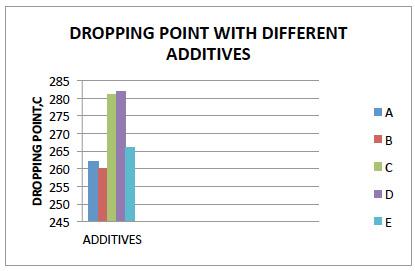
Experiment 2
As the developed process was found to be successful in paraffinic oil, the same was tried out in different types of base oils to check the efficacy of the process. The boron esters C &D which have given maximum boost in dropping point were selected for this study.
Following oils were selected.
Paraffinic
Naphthenic
Poly Alfa Olefin (PAO)
Oil Soluble Polyalkylene glycol (OSP)
Since the majority of Automotive and Industrial greases are made with base oil viscosity of VG-‐ 220, the same viscosity grade was used for making these greases. VG‐220 viscosity was achieved by blending light oil and heavy oil. No polymer was used to boost the viscosity.
The properties of the oils used are given in Table 2

TABLE 2
Only two of the above boron esters C & D which had given very good results were selected for further study. Lithium complex greases were prepared using the same developed method with HCO. Greases were prepared separately with these base oils of ISO VG-‐220 Grade using the boron esters C&D. In all these greases same dosages of the boron ester C & D were added. Also in all the greases 0.5 % of ZDDP was added.
It has been observed that addition of ZDDP further boosts the dropping point of lithium complex greases. It has been reported that ZDDP interacts with lithium hydroxide forming lithium dithiophosphate, zinc oxide and water. Zinc oxide further reacts with ZDDP forming basic ZDDP. Sivik and coworkers proposed that ZDDP has polar-‐polar association with lithium soap fibers.⁷ This could be the reason for further increase in dropping point of lithium complex greases by addition of ZDDP.
The dropping point of all these greases were determined by ASTM D-‐2265 test method and given in Table 3.
TABLE 3 The dropping point results are shown in bar chart .Fig.-‐2
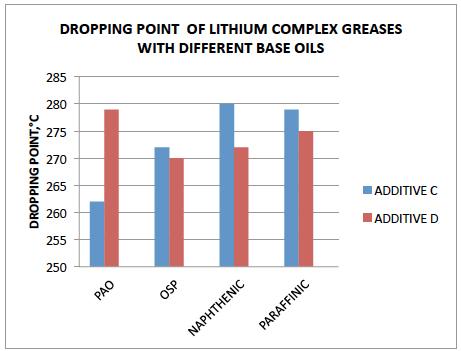
FIG.2
It is observed that both the additives C &D boost the dropping point of lithium base greases prepared with HCO in different base oils such as PAO, OSP, Naphthenic & Paraffinic oils.
However, the increase in dropping point is different with different base oils.
Although the boost in dropping point of lithium complex grease by addition of boron ester is not fully understood, there are different theories proposed. G.S. Bright had carried out systematic studies on the relationship of solubility parameters of various oils and the properties of lithium soap greases. He concluded that there appears to be straight line (inverse) relationship between the solubility parameters of
the oils and the dropping points of lithium 12 hydroxy stearate greases made from them. The higher the solubility parameter, the lower the dropping point.⁸ So the different solubility parameters of different oils might be responsible for different boost in dropping points of lithium complex greases prepared from these oils with addition of boron esters.
Experiment 3
Further, one of the additives (C) was used to prepare fully formulated lithium complex grease (Grease CX) with developed process from lithium base grease with HCO. This grease was evaluated for all the major tests. The properties of this grease were compared with the properties of fully formulated lithium complex grease (Grease CY) prepared with the same base oil and additives and with same boron ester but with lithium grease prepared with 12 HSA. One more batch of lithium complex grease (Grease DY) prepared from lithium grease with 12 HSA using boron ester D was also taken for comparison. The base oil used in all the three greases is same (VG-‐100 Paraffinic oil of Group 1). All the three greases were fortified with same EP and AW additives in the same dosages.
Grease CX-‐ Lithium Complex Grease prepared from lithium grease with HCO & borate ester C in paraffinic oil of VG-‐100 with EP & AW additives.
Grease CY-‐Lithium complex grease prepared from lithium base Grease with 12 HSA & borate ester C in paraffinic oil of VG-‐100 with EP& AW additives.
TABLE 4
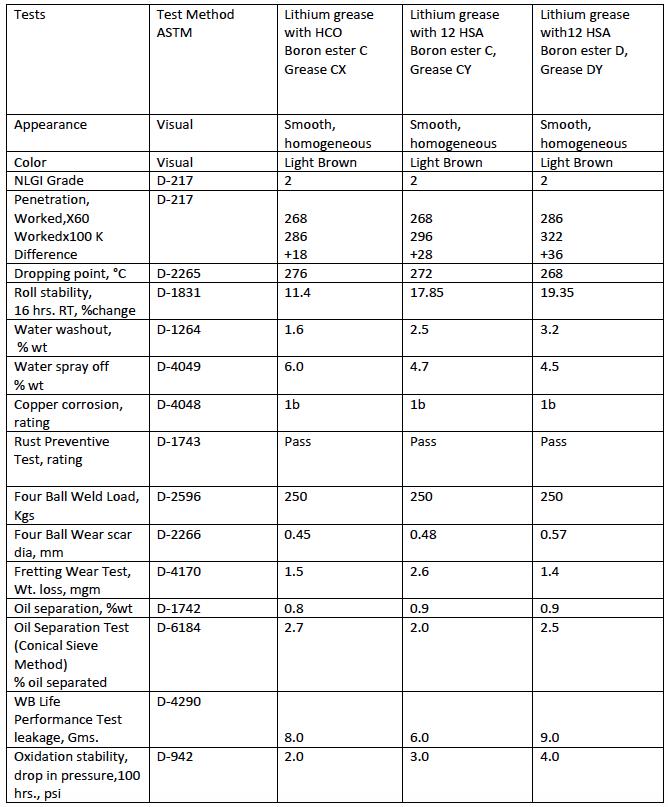
Grease DY-‐ Lithium complex grease prepared from lithium base Grease with 12 HSA & borate ester D in paraffinic Oil of VG-‐100 with EP& AW additives.
The properties of these three greases were compared and the test data is given in Table 4.
Discussions
Mechanical Stability
Table 4 gives the properties of the three greases CX, CY and DY prepared using boron esters C & D. A good comparison can be made between grease CX and grease CY prepared using boron ester C. The grease CX prepared using HCO has better mechanical stability than the grease CY prepared using 12 HSA. The difference in 100 K strokes penetration for grease CX is +18 units against +28 units for grease CY. The same trend is observed in Roll Stability test carried out for 16 Hrs. at room temperature. The percentage change in penetration for grease CX is 11.4 against percentage change of 17.8 and 19.3 for greases CY and DY respectively. This indicates that the lithium complex grease with HCO has better mechanical stability than the one prepared with 12 HSA.
High Temperature properties
The Lithium complex greases are recommended for many Automotive and Industrial applications as high temperature greases. Generally, the maximum recommended operating temperature for these greases is around 160 °C. The wheel bearing leakage test as per ASTM D-‐4290 was carried out on all the three samples. The test temperature is 160°C. All the three greases have given the leakage within 10 gms. which is the limit specified by GC specification under ASTM D-‐4950. The dropping points of all the three greases are above 260°C.
Fretting Wear Test
Fretting wear is a surface damage that occurs between two contacting surfaces which are in cyclic motions of small amplitude. Fretting Wear Test determines the ability of the grease to withstand such cyclic motions or vibrations or oscillatory motions. The test is carried out as per ASTM D-‐4170 test method. The results of all the three greases show that the weight loss due to oscillatory motion for all the three greases in Fretting wear test is almost similar and well within the limit of Chassis Grease requirement of LB as per ASTM D-‐ 4950.
Fretting Wear Test Apparatus
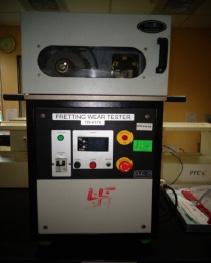
All the other properties such as EP, AW, corrosion inhibition and oxidation resistance properties of the three greases CX, CY and DY are comparable.
Water absorption Property
The ability of the grease to absorb water without undergoing much change in the consistency is an important property and for certain application becomes very critical. In many steel plant applications, where the grease comes in contact with copious amount of water, this property plays an important role. Lithium complex greases are very popular and widely used in steel plant applications. If the grease is able to maintain its consistency even in presence of water it is an added advantage. Lithium complex greases prepared with HCO and the boron ester have the ability to absorb water and still maintain its consistency.
Two greases A &B were taken. These are fully formulated greases with VG 100 paraffinic oil. One was prepared with Hydrogenated castor oil and the other with 12 hydroxy stearic acid. Both were fortified with boron ester C and other extreme pressure, antiwear, corrosion inhibitor and antioxidant additives at the same dosages. Both the greases were tested for 60 strokes penetration, 10,000 strokes penetration and 10,000 strokes penetration after addition of 10% water. The results are shown in Table 5
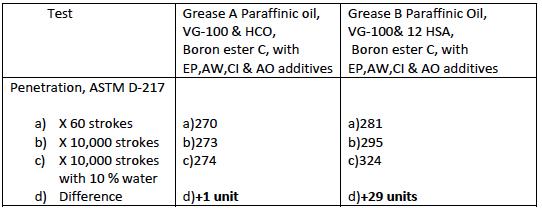
TABLE 5
The results show that the lithium complex grease prepared with HCO and the boron ester C has better stability in presence of water than the lithium complex grease prepared with 12 hydroxy stearic and the boron ester C. So this property of better stability in presence of water is expected to give better performance in applications where there is a possibility of copious amount of water coming in contact with grease such as steel plant applications.
Conclusions
Various boron esters have been evaluated and a process has been developed to manufacture Lithium complex greases with HCO & using these commercial additives based on boron esters chemistry.
Lithium complex greases prepared with HCO and boron ester have better mechanical stability as compared to lithium complex greases prepared with 12 HSA and same boron ester as demonstrated by the prolonged work penetration test and roll stability test results.
The developed process also works in other types of base oils such as naphthenic, poly alpha olefin oils and oil soluble polyalkylene glycol in raising the dropping point of lithium complex greases prepared with HCO.
Lithium complex grease prepared with hydrogenated castor oil and boron ester show superior water absorption property as compared to lithium complex grease prepared with 12 hydroxy stearic acid and the same boron ester.
Acknowledgement
The authors wish to thank the management of Standard Greases & Specilities Pvt. Ltd. for their support and permission to present this paper in NLGI Annual Meeting at Idaho, USA.
References
1. NLGI Lubricating Grease Survey 2013 2. “An Evaluation of sebacic acid and azelaic acid as thickeners in Lithium Complex
Greases” by W. Tuszynski, Ivanhoe
Industries Inc. & Paul Besette, Triboscience & Engineering Inc. NLGI Spokesman,
Vol.72, July 2008. 3. US Patent 3,125,525 May 17, 1964 W.R.
Siegart et al. 4. “An Investigation into use of Boron Esters to improve High-‐Temperature capability of Lithium 12 Hydroxy stearate Soap thickened Grease” By John Lorimor.
Presented at NLGI 76th Annual Meeting,
Arizona. 5. US Patent 4, 802, 999. Feb. 7, 1989. Koizumi et al. 6. “Boron Esters used as lubricant additives”
J. B. Yao et al., Lubrication Science Vol.14, issue 4,415-‐423, Aug. 2013. 7. “Interactions of Zinc Dithiophosphates with
Lithium 12 hydroxystearate Grease” Sivik
M.R. Zeitz J.B. Bayus D. Presented at NLGI
Annual Meeting 2001 at Florida. 8. “Base oils-‐An evolving landscape” by Alan
Outhwaite & John Rosenbaum, White paper
Lubrisense 2011.







